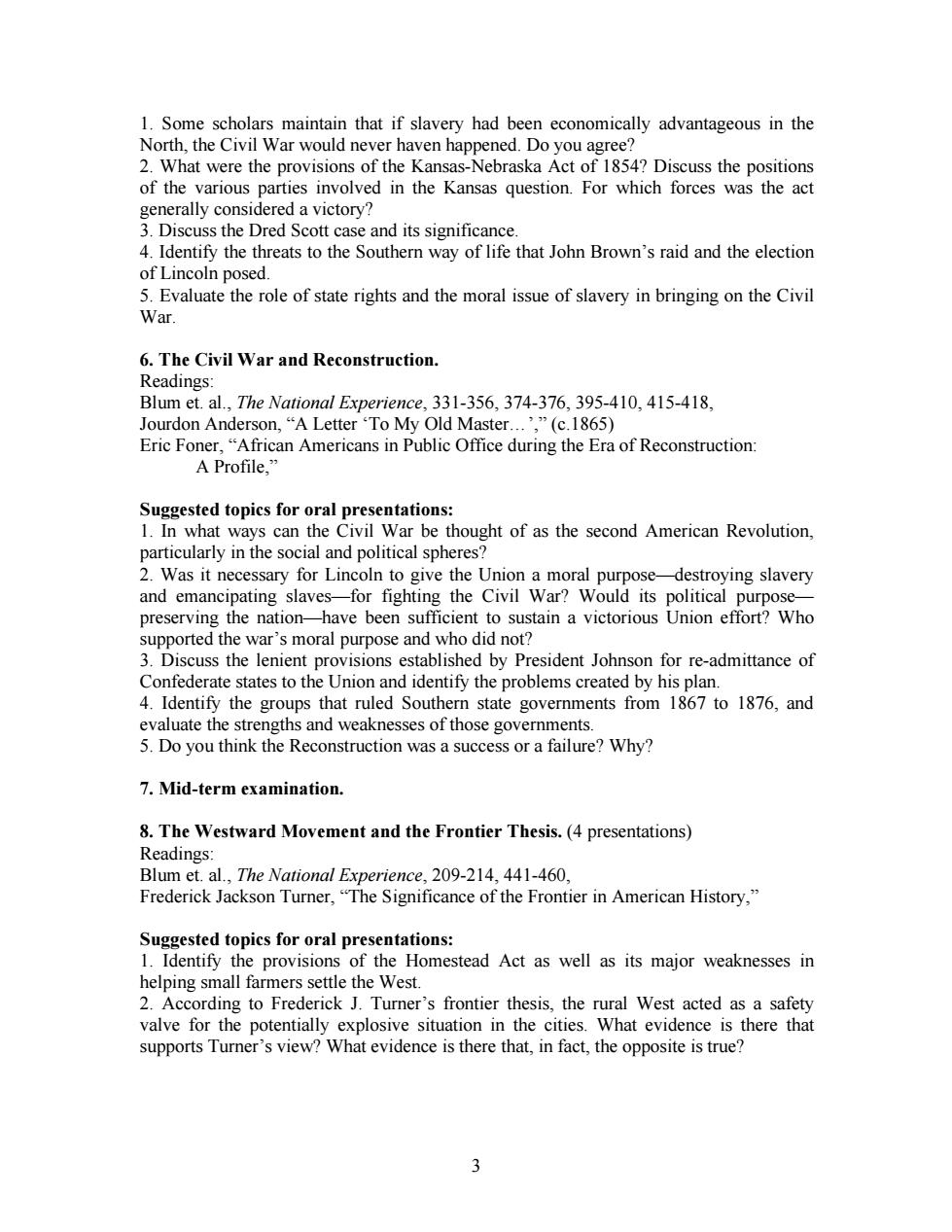正在加载图片...

1.Some scholars maintain that if slavery had been economically advantageous in the North,the Civil War would never haven happened.Do you agree? 2.What were the provisions of the Kansas-Nebraska Act of 1854?Discuss the positions of the various parties involved in the Kansas question.For which forces was the act generally considered a victory? 3.Discuss the Dred Scott case and its significance. 4.Identify the threats to the Southern way of life that John Brown's raid and the election of Lincoln posed. 5.Evaluate the role of state rights and the moral issue of slavery in bringing on the Civil War. 6.The Civil War and Reconstruction. Readings: Blum et.al.,The National Experience,331-356,374-376,395-410,415-418 Jourdon Anderson,"A Letter To My Old Master...',"(c.1865) Eric Foner,"African Americans in Public Office during the Era of Reconstruction: A Profile,” Suggested topics for oral presentations: 1.In what ways can the Civil War be thought of as the second American Revolution, particularly in the social and political spheres? 2.Was it necessary for Lincoln to give the Union a moral purpose-destroying slavery and emancipating slaves-for fighting the Civil War?Would its political purpose- preserving the nation-have been sufficient to sustain a victorious Union effort?Who supported the war's moral purpose and who did not? 3.Discuss the lenient provisions established by President Johnson for re-admittance of Confederate states to the Union and identify the problems created by his plan. 4.Identify the groups that ruled Southern state governments from 1867 to 1876,and evaluate the strengths and weaknesses of those governments. 5.Do you think the Reconstruction was a success or a failure?Why? 7.Mid-term examination. 8.The Westward Movement and the Frontier Thesis.(4 presentations) Readings: Blum et.al.,The National Experience,209-214,441-460, Frederick Jackson Turner,"The Significance of the Frontier in American History," Suggested topics for oral presentations: 1.Identify the provisions of the Homestead Act as well as its major weaknesses in helping small farmers settle the West. 2.According to Frederick J.Turner's frontier thesis,the rural West acted as a safety valve for the potentially explosive situation in the cities.What evidence is there that supports Turner's view?What evidence is there that,in fact,the opposite is true? 33 1. Some scholars maintain that if slavery had been economically advantageous in the North, the Civil War would never haven happened. Do you agree? 2. What were the provisions of the Kansas-Nebraska Act of 1854? Discuss the positions of the various parties involved in the Kansas question. For which forces was the act generally considered a victory? 3. Discuss the Dred Scott case and its significance. 4. Identify the threats to the Southern way of life that John Brown’s raid and the election of Lincoln posed. 5. Evaluate the role of state rights and the moral issue of slavery in bringing on the Civil War. 6. The Civil War and Reconstruction. Readings: Blum et. al., The National Experience, 331-356, 374-376, 395-410, 415-418, Jourdon Anderson, “A Letter ‘To My Old Master…’,” (c.1865) Eric Foner, “African Americans in Public Office during the Era of Reconstruction: A Profile,” Suggested topics for oral presentations: 1. In what ways can the Civil War be thought of as the second American Revolution, particularly in the social and political spheres? 2. Was it necessary for Lincoln to give the Union a moral purpose—destroying slavery and emancipating slaves—for fighting the Civil War? Would its political purpose— preserving the nation—have been sufficient to sustain a victorious Union effort? Who supported the war’s moral purpose and who did not? 3. Discuss the lenient provisions established by President Johnson for re-admittance of Confederate states to the Union and identify the problems created by his plan. 4. Identify the groups that ruled Southern state governments from 1867 to 1876, and evaluate the strengths and weaknesses of those governments. 5. Do you think the Reconstruction was a success or a failure? Why? 7. Mid-term examination. 8. The Westward Movement and the Frontier Thesis. (4 presentations) Readings: Blum et. al., The National Experience, 209-214, 441-460, Frederick Jackson Turner, “The Significance of the Frontier in American History,” Suggested topics for oral presentations: 1. Identify the provisions of the Homestead Act as well as its major weaknesses in helping small farmers settle the West. 2. According to Frederick J. Turner’s frontier thesis, the rural West acted as a safety valve for the potentially explosive situation in the cities. What evidence is there that supports Turner’s view? What evidence is there that, in fact, the opposite is true?